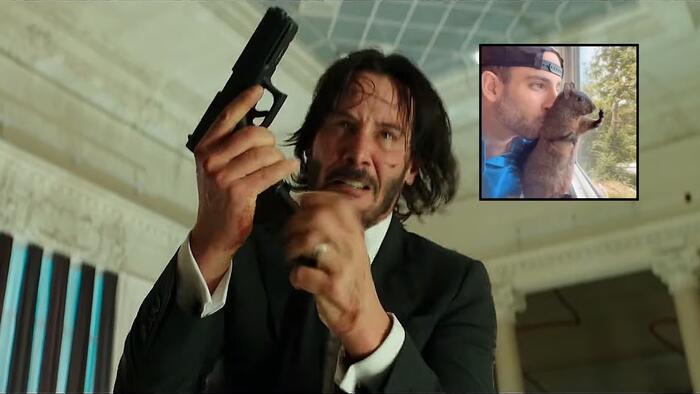The recent news surrounding the euthanasia of Peanut, a beloved pet squirrel, has ignited public outrage and debate across social media platforms. Peanut was seized from the home of his owner, Mark Longo, during a five-hour raid conducted by the New York State Department of Environmental Conservation (DEC). The raid followed an anonymous complaint about Longo’s P’nuts Freedom Farm, a nonprofit animal rescue organization he established to honor Peanut’s memory. Following the raid, officials euthanized Peanut along with another animal, a raccoon, ostensibly to test for rabies, which has led many to question the motivations and procedures of the DEC in this case.
Mark Longo described Peanut as his best friend and expressed his deep sorrow over the loss in an emotional farewell post that attracted a significant amount of attention online. The squirrel had been with Longo for seven years after being orphaned; he decided to provide a loving home for Peanut after the animal’s mother was killed in a car accident. Longo has since appealed for financial assistance to fund a legal battle against the state, which he believes acted unjustly. He emphasized the role that Peanut played in his life and the lives of countless others who followed their story on social media, bringing joy and fostering a sense of community around animal rescue efforts.
In the wake of Peanut’s death, social media exploded with expressions of outrage, sympathy, and humor. Many users posted memes and comments that highlighted their disbelief and anger at the government’s actions. The aggressive nature of the raid, likening it to a drug bust, was particularly shocking to many observers. Users voiced their frustrations through various platforms, emphasizing their solidarity with Longo and the broader animal rights movement. The case has become emblematic of a growing discontent with government overreach and the seemingly arbitrary exercise of power in what should be a compassionate community effort.
As anger spread across the internet, it became apparent that the case would resonate with those who already felt disenfranchised or frustrated by government policies. The narrative of a joyful and innocent animal being taken by state officials struck a chord with many individuals, sparking fierce debates about animal rights, bureaucracy, and the treatment of pets. Mashups of political commentary and satire emerged, with references to Peanut’s situation serving as a symbol of broader civic irritation. Proponents of animal welfare argued that actions must be taken to ensure that similar situations do not arise in the future, suggesting a need for increased scrutiny and accountability for state agencies.
Critics of the government’s actions further solidified the perception that certain procedures were overly rigid and lacked compassion. They expressed concerns about how regulations may lead to the unnecessary loss of life, especially for animals that are pets and part of families. Notably, public figures and influential commentators weighed in on the incident, making claims that Peanut’s case illustrated a larger issue with government power dynamics and their consequences. The widespread discourse also identified a potential political dimension to the issue, with some attributing the situation to partisan differences in governance and animal rights.
The decision to euthanize Peanut has undoubtedly galvanized public sentiment and served as a catalyst for action within the animal rights community. As Mark Longo fights for justice for Peanut, he also implores others to rally behind the cause of animal welfare, emphasizing the importance of compassion and understanding in how societies treat their animals. Longo’s fight may not only reflect a personal loss but could also drive a transformation in policies that govern the treatment of pets and rescues, ultimately ensuring that such preventable tragedies do not happen again. As the story unfolds, it remains to be seen what impact it will have on regulations regarding the ownership and rescue of exotic or unconventional pets, particularly in New York State.

